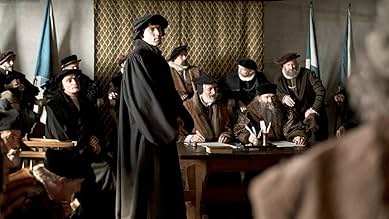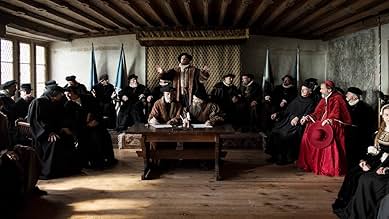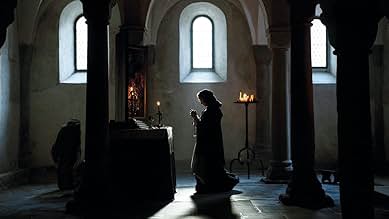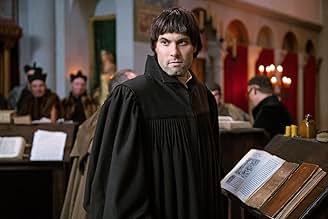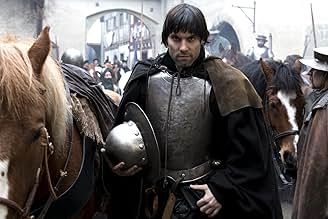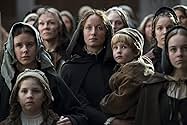VALUTAZIONE IMDb
6,7/10
422
LA TUA VALUTAZIONE
A Zurigo nel 1519, la giovane vedova Anna Reinhart vive tra paura della chiesa e preoccupazioni per i suoi tre figli, quando l'arrivo di un nuovo prete in città provoca sconvolgimenti, scate... Leggi tuttoA Zurigo nel 1519, la giovane vedova Anna Reinhart vive tra paura della chiesa e preoccupazioni per i suoi tre figli, quando l'arrivo di un nuovo prete in città provoca sconvolgimenti, scatenando discussioni aspre con i suoi sermoni.A Zurigo nel 1519, la giovane vedova Anna Reinhart vive tra paura della chiesa e preoccupazioni per i suoi tre figli, quando l'arrivo di un nuovo prete in città provoca sconvolgimenti, scatenando discussioni aspre con i suoi sermoni.
- Regia
- Sceneggiatura
- Star
- Premi
- 1 vittoria e 4 candidature totali
Recensioni in evidenza
Zwingli did in Zurich what Luther and Calvin did in Germany and Geneva. We don't know much about him as a person, but the chronology of the Zurich reformation is pretty well documented. This film sticks to the historical facts as far as possible. In its (necessarily invented) portraits of Zwingli and his wife, it adds a welcome human dimension that makes it very accessible. I live in Zurich but didn't grow up here, so I knew little of the story before seeing this film. It was the most enjoyable, lively and colourful history lesson I ever had. Warmly recommended to anyone with an interest in the subject.
An "ad usum Delphini" portrait of Ulrich Zwingli, pleasant, nice, decent crafted, reminding the romanticized stories of early youth of viewer, it is a soft image of reformation in Zürich, the love story representing, not just surprising, the heart of it.
Good performances, not bad definition of obstacles, not real comfortable for a not Protestant * being myself Greek Orthodox, few scenes were not so easy be accepted ) , but serving in good manner the purpose to offer to a large audience a fair trip across the birth of Protestant Church in one of significant cities of Swizeland, the details of XVI century being beautiful crafted, to rooms, clothes and building, city life and attitudes. So, just pleasant, not having the ambition to be more than an introduction .
Good performances, not bad definition of obstacles, not real comfortable for a not Protestant * being myself Greek Orthodox, few scenes were not so easy be accepted ) , but serving in good manner the purpose to offer to a large audience a fair trip across the birth of Protestant Church in one of significant cities of Swizeland, the details of XVI century being beautiful crafted, to rooms, clothes and building, city life and attitudes. So, just pleasant, not having the ambition to be more than an introduction .
It's a biopic of Reformation leader Ulrich Zwingli during his Zurich, Switzerland, years from 1519-1531. It particularly interested me because of the references to the earliest Anabaptists.
Ulrich Zwingli (Maximilian Simonischek) arrives in Zurich as a 35-year-old Catholic priest. However, he is keenly desirous of reform because of the abuses in the church, especially the disregard for the poor and orphaned. He begins to preach and read scripture in German rather than Latin, which the ordinary people could not understand. One of his avid listeners is Anna Reinhardt, a young widow with three children. Her husband died in battle two years earlier, and she has been purchasing masses for his benefit in purgatory. Her pastor, Zwingli, urges her to spend her limited funds on the living, not the dead.
In 1519 Zwingli falls ill with the plague, and Anna, a neighbor, cares for him. A romantic relationship develops through this beginning, helping to gird Zwingli's demand that the clergy be allowed to marry.
The film follows Zwingli's reforms aided by his fellow priest, Leo Jud (Anatole Taubman), and the head of Zurich's council, Master Roist (Stefan Kurt). His Catholic archrival is Johann Faber (Oscar Bingisser). Two of his adherents who push for more radical reforms are Felix Manz (Michael Finger) and Konrad Grebel (Aaron Hitz). Interestingly, the film shows Anna (now) Zwingli as quite sympathetic to the radicals. However, as the 1520s ebb, the reaction of the Catholic cantons increases, and Zwingli finally heads into an ill-fated battle.
"Zwingli: Der Reformator" is partly sponsored by the Swiss Reformed Church, but Zwingli's shortcomings are not omitted. Although Zwingli clearly states his rationale against adult baptism, he seems ambivalent about Manz's execution. In a movie of this type, some shortcuts occur. Early Anabaptist leader George Blaurock is absent from the film, so the first adult baptisms are shown to involve only Manz and Grebel. Interestingly, Manz is a more robust figure than Grebel in the movie. Nevertheless, "Zwingli" is a good film that shows Zwingli as a great social reformer with solid political support.
Ulrich Zwingli (Maximilian Simonischek) arrives in Zurich as a 35-year-old Catholic priest. However, he is keenly desirous of reform because of the abuses in the church, especially the disregard for the poor and orphaned. He begins to preach and read scripture in German rather than Latin, which the ordinary people could not understand. One of his avid listeners is Anna Reinhardt, a young widow with three children. Her husband died in battle two years earlier, and she has been purchasing masses for his benefit in purgatory. Her pastor, Zwingli, urges her to spend her limited funds on the living, not the dead.
In 1519 Zwingli falls ill with the plague, and Anna, a neighbor, cares for him. A romantic relationship develops through this beginning, helping to gird Zwingli's demand that the clergy be allowed to marry.
The film follows Zwingli's reforms aided by his fellow priest, Leo Jud (Anatole Taubman), and the head of Zurich's council, Master Roist (Stefan Kurt). His Catholic archrival is Johann Faber (Oscar Bingisser). Two of his adherents who push for more radical reforms are Felix Manz (Michael Finger) and Konrad Grebel (Aaron Hitz). Interestingly, the film shows Anna (now) Zwingli as quite sympathetic to the radicals. However, as the 1520s ebb, the reaction of the Catholic cantons increases, and Zwingli finally heads into an ill-fated battle.
"Zwingli: Der Reformator" is partly sponsored by the Swiss Reformed Church, but Zwingli's shortcomings are not omitted. Although Zwingli clearly states his rationale against adult baptism, he seems ambivalent about Manz's execution. In a movie of this type, some shortcuts occur. Early Anabaptist leader George Blaurock is absent from the film, so the first adult baptisms are shown to involve only Manz and Grebel. Interestingly, Manz is a more robust figure than Grebel in the movie. Nevertheless, "Zwingli" is a good film that shows Zwingli as a great social reformer with solid political support.
Lo sapevi?
- Colonne sonoreTHE REFORMER: ZWINGLI - ORIGINAL MOTION PICTURE SOUNDTRACK
Written by Diego Baldenweg, Nora Baldenweg, Lionel Baldenweg
Performed by Diego Baldenweg, Nora Baldenweg, Lionel Baldenweg with Daniel Hope, Zurich Chamber Orchestra, Larissa Bretscher, Vokalensemble Zürich West
Produced by GREAT GARBO music
I più visti
Accedi per valutare e creare un elenco di titoli salvati per ottenere consigli personalizzati
Dettagli
- Data di uscita
- Paesi di origine
- Sito ufficiale
- Lingue
- Celebre anche come
- The Reformer. Zwingli: A Life's Portrait.
- Aziende produttrici
- Vedi altri crediti dell’azienda su IMDbPro
Botteghino
- Budget
- 5.500.000 CHF (previsto)
- Tempo di esecuzione2 ore 8 minuti
- Colore
Contribuisci a questa pagina
Suggerisci una modifica o aggiungi i contenuti mancanti

Divario superiore
What is the English language plot outline for Zwingli - Der Reformator (2019)?
Rispondi
